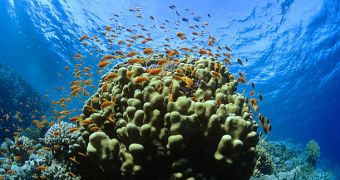A new research whose findings were published in the scientific journal Nature Geoscience shows how coral reefs stand to be affected by particulate pollution, despite their living under the sea and never coming in direct contact with such atmospheric pollutants.
The specialists now stating that particulate pollution halts coral growth base their claims on the fact that particulate pollution in the atmosphere keeps sunlight from properly reaching the waters surrounding coral reefs.
This leads to both the corals' having to endure cooler temperatures, and to their being left without some of the photosynthetic algae known to grow on them.
Since these algae constitute an energy and nutrients source for the coral reefs, it need not come as a surprise that their no longer thriving on corals impairs the latter's growing patterns.
Science News quotes Dr. Paul Halloran, who argued as follows:
“Particulate pollution or ‘aerosols’ reflect incoming sunlight and make clouds brighter. This can reduce the light available for coral photosynthesis, as well as the temperature of surrounding waters. Together these factors are shown to slow down coral growth.”
Coral reefs have already been shown to be affected by a phenomenon referred to by the scientific community as ocean acidification.
Because of this, the news that they are also vulnerable to particulate pollution in the atmosphere has specialists worried that marine ecosystems run even more risks of being heavily affected by human society's heavily industrialized ways.
As Lester Kwiatkowski, study lead author and PhD student at the University of Exeter puts it, “Coral reefs are the most diverse of all ocean ecosystems with up to 25% of ocean species depending on them for food and shelter.”
“They are believed to be vulnerable to climate change and ocean acidification, but ours is the first study to show a clear link between coral growth and the concentration of particulate pollution in the atmosphere,” Lester Kwiatkowski further wished to stress.

 14 DAY TRIAL //
14 DAY TRIAL //